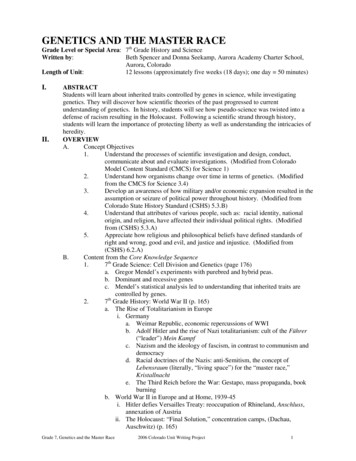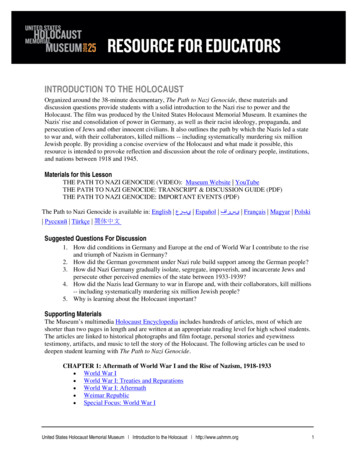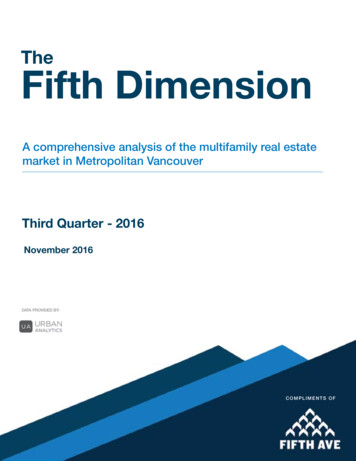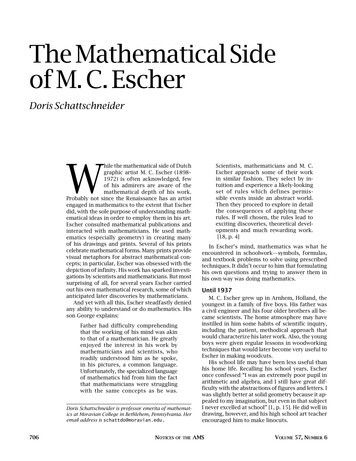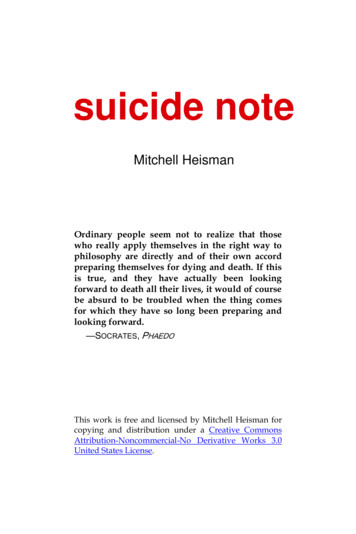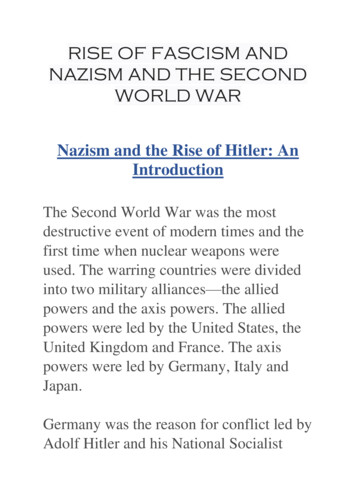
Transcription
RISE OF FASCISM ANDNAZISM AND THE SECONDWORLD WARNazism and the Rise of Hitler: AnIntroductionThe Second World War was the mostdestructive event of modern times and thefirst time when nuclear weapons wereused. The warring countries were dividedinto two military alliances—the alliedpowers and the axis powers. The alliedpowers were led by the United States, theUnited Kingdom and France. The axispowers were led by Germany, Italy andJapan.Germany was the reason for conflict led byAdolf Hitler and his National Socialist
German Workers’ Party or the Nazi Party.Adolf Hitler was the leader of Germanyfrom 1933 to 1945. During hisgovernment, Germany was called as NaziGermany.Nazi Germany followed the ideologycalled Nazism or National Socialism thatpromoted violent practices to restoreGerman pride. In September 1939, toconquer more land and resources forGermany, Hitler invaded Poland, sparkingoff world war two.In the end of World War in 1945, theAllied Powers demanded justice from thedefeated Axis Powers, especiallyGermany. A Tribunal was set up in theGerman city of Nuremberg to prosecuteNazi leaders. Nazi Germany’s efforts toeliminate the Jews and other communities
are referred to as genocidal crimes. Theterm Genocide was coined in 1944 todescribe the act of destroying a communitybased on nationalism, racism, religion orethnicity.At the Nuremberg Trials Hitler and hisNazi government were accused ofcommitting genocide against Jews. Hitlerwas not tried at Nuremberg because hecommitted suicide a month before worldwar two ended.The genocide committed by Nazi Germanybetween 1933 and 1945 is referred to asthe Holocaust.
Italy and FascismItaly during the warIn the First world war Italy joined theAnglo-French alliance against Germanyand other allies. Italy had always wanted tounite the Italian speaking provinces ofEurope and hoped that after the war itwould be rewarded for supporting them.Italy after the warAfter the war the Treaty of Versaillesoffered very little to componsate for all thedistruction and lossess Italy had suffereddue to the war. Italy felt deeply hurtand angered and realised that it had beencheated. Italy received only two islands in
the Adriatic and Aegean seas.Italy suffered due to the heavy deaths andresession and rising unemployment.Thepeople Italy started voicing theirdispleasure at the situation. Farmers,workers and the unemploy people joinedhands to organise strikes all over thecountry. This led to the growth of anextreme nationalism called Fascism inItaly.Meaning of Fascism.The word fascism originated from theLatin word 'Fascio'. Fascio means a bundleof sticks, it was the royal symbol of theRoman emperors of the ancient times andsignificant strength of unity.
MussoliniBanito Mussolini, eastablished the Fascistparty in 1919 at Milan. He started hiscareer as a journalist and became PrimeMinister of Italy.Members of this partywere called Black shirts because of theiruniform.Features of Fascism The Member of Fascism were opposedto democracy, socialism and liberalism.They believed in having a powerfuldictator with unlimited power.The three main principles of them werestate worship, Leader worship, and Warworship.Mussolini - Prime MinisterBanito Mussolini, promised to bring backthe lost glory of the Roman empire to Italy
after the first world war. When Italiancommunists called a strike Mussoliniprevented the strike and presented himselfas a protectoe of law and order. Due to thisKing Victor Emmanuel III Offered thePrime Minister post to Mussolini.Welfare measures of Mussolini He contructed hospitals, roads andbridges.Some progress was made Industriesand agriculture.Brought a Labour court to improverelations between capitalists andlabour.Domestic policy of Mussolini Who opposed fascism were open tosuspician.Right to freedom of Speech wasrestricted.
Compulsary military and censoredpressRecognised the pope as the sovereignhead of the Vatican.Foreign Policy of Mussolini Mussolini compelled Greece to paycompensation.He declared war on Abyssinia in 1935.Captured Ethiopia.Established colonies in East africa andLibya.Mussolini wanted to make Italy great,respected and feared. When he declaredwar on Abyssinia League of Nations statedItaly as an aggressive country. Imposedeconomic sanctions but Mussolinidiregarded these sanctions and occupiedAbyssinia. He also joined hands with
Germany , which finally led to the secondworld war.Living in the Weimar RepublicThe years 1918 and 1919 were asignificant period in German historymarking important events like the Germanrevolution of 1918, defeat in world warone, abdication of Emperor Wilhelm andthe birth of the Weimar republic.The Weimar Republic, established in 1919,replaced the imperial government andformed a parliament called the Reichstag.The Weimar signed a peace treaty ofVersailles which made things very difficultfor the budding republic making themstruggle to meet the terms. Socialists,
Catholics and Democrats who supportedthe republic were ridiculed and called theNovember criminals.Infighting began between differentpolitical groups most popular being theSpartacist League – a group of radicalsocialists. The Weimar Republic crushedthe Spartacist uprising with the help of agroup of war veterans called the FreeCorps. The dejected Sparatacist leaguethen formed the Communist Party ofGermany. The Weimar Republic faced aneconomic crisis in 1923 when they wereunable to pay the war damages. To combatthe situation, the Weimar printed extracurrency notes. This resulted inhyperinflation causing a fall in the value ofthe German Mark.The Americans aided Germany through the
Dawes plan but the support was withdrawnin 1929 when the Wall Street Exchangecrashed.On 24 October 1929, referred to as BlackThursday, 13 million shares were sold atthe Wall Street Exchange.The world had entered the GreatDepression in 1929 and as Germany wasdependent on US money it was severely hitwith this economic crisis. In 1933, theWeimar Republic finally collapsed pavingthe way for Hitler’s Nazi Party to takecontrol of Germany.Hitler Rises to PowerAdolf Hitler was born in 1889 in anAustrian village and was raised by an over
protective mother and a disciplinarianfather.He wanted to be a painter and enrolled inthe German army in 1913 and won medalsfor his bravery in WWI. Germany afterWWI elected a new Government called theWeimar Republic and signed the VersaillesPeace Treaty in 1919. Many Germans,especially war heroes like Hitler wereupset with this. Citizens and heroesbecame anti-government.In 1919 Hitler got selected as the GermanWorkers' Party leader owing to hisexcellent oratory skills, his devotion toGerman pride and his growing anti-Jewishsentiments two years later.Hitler renamed the German Worker’sParty, as the National Socialist German
Workers Party and used differentpropaganda to reach out to the Germanpeople. Hitler’s powerful speeches andgrand rallies were reinforced throughcolourful posters and flyers. The wavingred flags further added to the aggressiveenergy of Nazi parades.When Hitler got arrested after a failedcoup to take over the Weimar in 1923, hewrote his famous autobiography “MeinKampf” or my struggle.In the 1930 and 1932 election the NaziParty got a majority of the seats in theReichstag. The Weimar Republic fell andwas replaced with Hitler’s Third Reichgovernment. On 30th January 1933 AdolfHitler was appointed chancellor ofGermany.
Destruction of Democracy andreconstructionOn 30 January 1933, Adolf Hitler wasappointed Chancellor of Germany byPresident Hindenburg. His Nazigovernment, called the Third Reichimplemented many undemocratic policieslike The Reichstag Fire Decree, TheEnabling Act, the Gestapo and theConcentration Camps.Communist leaders that opposed him wereforcibly arrested and imprisoned and madeto work free for the government. TheEnabling Act was passed on 23rd March1933 which gave Hitler the power to passlaws without consulting the Reichstag.Nazi appointed secret state police calledthe Gestapo which roamed the streets.
They were supported by the ShieldSquadron, an intelligence service andparamilitary stormtroopers. Theextermination camps were purely meantfor killing prisoners that were unable towork or undesirable to the Nazis.In 1934, after President Hindenburg’sdeath, Hitler combined the offices of thePresident and Chancellor and became thesole leader of Germany.Advising Hitler on economic growth wasDr Hjalmar and Schacht Germany’sMinister of Economics used innovativepolicies, to reduce the economic deficit bycreating new trade agreements with Southeast Europe. He started building highwayscalled Autobahns Volkswagen to become asymbol of the German worker’s newfoundprosperity.
With the success of Volkswagen factory,the German economy became the quickest,among all world economies, to recoverfrom the Great Depression. In order tospread his military might, Hitler ordered32,000 soldiers to reoccupy the Rhinelandon 7th March 1936.After Hitler annexed Czechoslovakia andAustria, he invaded Poland in September1939, sparking off World War Two. Togain support, Germany entered theTripartite Pact or Three Power Pact inSeptember 1940 with Italy and Japan, Thisagreement established the Axis Powers inWorld War Two. Initially Germany waswinning the war but it invaded the SovietUnion on 22nd June 1941 it was pushedback by 1945 all the way to Berlin. Japanmeanwhile on December 1941, attacked
the US base at Pearl Harbor, forcing theUnited States to enter World War Two.The Americans dropped nuclear atomicbombs on Hiroshima and Nagasaki—on6th an 9th august 1945.Hitler’s efforts to restructure Germanyended the world war in May 1945. Hisdetermination to revive the Germaneconomy was ultimately based on antidemocratic go-to-war ideologies.Nazi Policies and PracticesHitler was voted to power based on hisideology called Nazism. The partly wasinfluenced by Darwin’s and Spencer’stheory and promised to restore economicprosperity, global leadership and German
pride. Hitler believed that people existedin a racial hierarchy and that pure NordicAryans were the purest race.He eliminated everyone who was not aracially pure Nordic Aryan German andcreated a pure German racial state.However, Jews were one of the biggestgroups he targeted. The persecution of theJews was an act of genocide from 1933 to1945 which is referred to as the Holocaust.The persecution and genocide were carriedout in three stages. Stage 1 was calledExclusion.Between 1933 and 1939 Nazi Germanshops, restaurants and political ralliesfreely distributed anti-Semitic propagandato ensure that Jewish business and serviceswere boycotted and their properties wereconfiscated or sold off. Hitler withdrew all
the Civil rights of the Jews.Stage 2 was called Ghettoisation. From1940 to 1944, Jews were forced to live inJew-only ghettos in the generalgovernment area, which comprisedGerman-occupied parts of Poland. In otherwords, they were made to live inunhygienic conditions and isolatedcommunities.Stage 3 was called Annihilation. Prisonerswere brought the concentration andextermination camp which had gaschambers where people were drenchedwith cyanide pellets. Auschwitz, Polandwas the biggest Nazi concentration andextermination camp. On 19th May 1943,Germany was declared clean of Jews.
The Second World WarCauses of the Second WorldWarThe Treaty of VersaillesThe peace treaties left the defeatedcountries humiliated. The people of thesecountries were joblesss, hunger, poor,homesless and suffered for many years.Europe great economic depression peoplelost faith in their governments.This madedictators come to power and these dictatorsaimed at bringing back their glory.Germany was humiliated.German aggression
Germans felt hurt , angered and humiliatedby the terms of the Treaty of Versailles.Germany was forced to reduce its military.Germany borrowed heavily from othercountries followed by inflation andumemployment. People blamed the leadersof Weimar republic.Hitler sent Jews to concentration camps,where most of them dead by deliberateextermination in gas chambers andshooting, or through starvationand overwork. Hitler occupied Rhine landthat has been demilitarized by the Treatyof versailles.Italian Aggression
Banito Mussolini, promised to bring backthe lost glory of the Roman empire to Italyafter the first world war.He wanted tomake Italy great, respected and feared.When he declared war on AbyssiniaLeague of Nations stated Italy as anaggressive country. Mussolini disregardedthe economic sanctions UNO and occupiedAbyssinia.He also joined hands with Germany ,which finally led to the second world war.Mussolini compelled Greece to paycompensation.He declared war onAbyssinia in 1935. He Captured Ethiopiaand Established colonies in East africa andLibya.Failure of League of Nations
The rise of dictator ships frustrated allattempts to maintain peace. The Japaneseinvasion of Manchuria openly challengedthe League's authority. The permanentmembers always opposed decisions whichwent against their own intersts. TheLeague of Nations lacked universalrepresentation and it had no internalArmy.Rise of FascismThe Members of Fascism were opposed todemocracy, socialism and liberalism.They believed in having a powerfuldictator with unlimited power. The threemain principles of them were stateworship, Leader worship, and Warworship.
Immediate causeDanzig, had been made a free city-stateunder Polish influence guaranteed by theLeague of Nations. The Nazi governmentmade efforts to establish friendly relationswith Poland. Hitler demanded the port ofDanzig from Poland. Poland refused,fearing losing de facto access to the sea.Germany invaded Poland on September 1,1939.Failure of League of NationsThe League of NationsTo avoid repetition of a disaster like theFirst World War an international body wascreated. The League nations was anorganisation formed after the First World
war to maintain peace and security in theworld. The League formed to provide aforum for resolving international disputes.The League of Nations was aninternational organization, headquarteredin Geneva, as Switzerland was a neutralcountry and had not fought in the FirstWorld War. The League of Nations wasformed in 1919. This was the firstorganisation to be set in an internationallevel.Many countries of the world jounedbelieving that this oraginisation that workfor mutual compromise among nations. Itwas a great task for league of nations tomaintain peace and security in the world.44 countries from all over the world hadsigned a covenant to establish thisorganisation. It failed du e to inherentdefects.
Causes of Failure Great powers are not in its members.The United stated was not a member atall. Germany joined in 1925.Russia wasallowed entry in 1934.Britain was given praiority over othercountries. The permanent membersalways opposed decisions which wentagainst their own intersts.Countries defeated in the first word warwere burdened with large debts.Defeated countries left with somearmies. Some territories of the defeatedcountries were taken away.Countries like Japan and italy on theside of victorious in the war were alsounhappy with their share of the warspoils.The League of Nations lacked universalrepresentation and it had no internalArmy.
Economic instability is also anotherreason for failure of League.Wars of AggressionThe rise of dictator ships frustrated allattempts to maintain peace. The Japaneseinvasion of Manchuria openly challengedits authority which encouraged Mussoliniand Hitler.Locarno PactMember countries started signing pactswhich would benifit them. Britain, France ,Belgium, Germany and italy signed a pactcalled Locarno pact. According to thisFrance, Belgium and Germany agreed thatthey do not wage war with one other.
Britain and Italy agreed to support theattacked countryies.Militarisation of JapanMany years ago Japan was having castesystem. The people were divided intodifferent castes they are high and low. The high class consisted ofSamurai, warriers.The shougun wasthe head of the samurai class and ruledin the name of the emperor. Shougunwere more powerfull than the emperor.The low class comprised commontraders.The Meiji restorationWhen the caste ended the period between1867 and 1868, The Meiji restoration tookplace. During this period the shogun and
samurai classes were desolved and modrenclass less military force was emerged. Thiswas the begining of the modernisation andthe militarisation of Japan.MilitarisationTo defend the country a strong military isneeded. Developing and maintaining amilitary is called militarisation. Due tothis militarisation Japan became animportant factor of World war II.In 1864, Japanese tribe, Choushu wasdefeated by the armies ofAmerica, Britain, Holland and France.This attack made Japan feel inferior tothem in military. To over come this Meijicentral government introduced severalmilitary reforms to make Japan as strongas the western powers.In Japan feudal army was replaced by
National army . Military education wasmade compulsary . Military academieswere opened along with the navy trainingcentre in Tokyo. Here discipline and senseof nationliasm was inculcated among theJapanese. The usage of modern weaponsalso taught in the academies. Japanesearmy was given access to railways,telegraph and other facilities.Japan's attitude resulted in two wars: The Sino-Japanese War -1894The Russo – Japanese War – 1904Sino-Japanese War -1894Korea was on the Japanese boarder whichhad a weak government.Japan feared thatthe European powers would establishedcontrol over Korea. So, Japan establishedmilitary instalation close to its boardersbecause independence of Korea isessential for Japan's security.
Japan suggested Korea to introducemilitary reforms but Korea ignored due tothis Japan Attacked korea. Japan said toother countries that they were doing it toprotect them selves.China came to support Korea and declaredwar on Japan and the war ended with atreaty called Shimonoseki, Japan got someof China's territory including some parts ofManchria with this victory Japan wasconsidered as one of the great powes ofthe world.Russo-Japanese War -1904Russians supported China in SinoJapanese war and in return Russia got theChinese portion of Manchuria. Japanfeared that it would be attacked by
Russia at any movement. This resultedinto the war of 1904, which ended withthe treaty of Portsmouth in 1905.This victory made Japan gain a specialrights over Korea and Manchuria. Afterthese victories Japan slowly startedemerging as a military power and tried toincrease its territory. Japan aided the alliesin World War One as the war ended theJapanese realised that they were not givenan equal share of the plunders as thewestern nations but they won back thewhole of the Shatung region.Japan lost theShotung pennsula after the 1921Washington Conference.Growing militarisation made armyofficials of Japan gain control over thegovernment. In 1931 Japan attacked andoccupied Manchuria. From 1937 Japan
started conquering main land of China. In1940 it decided to join hands withGermany and Italy in the Second WorldWar.Advantages of MilitarisationIt made the country an extremley powerfulnation.Its attitude of balancing attack withdefence Japan became an importantparticipant in theSecond World War.Disadvantages of MilitarisationCompulsary military education left hardlyany one to work in the fields and factories.Shortagte of working hands resulted in tochild laboiur in farms and factories.Growing militarisation destroyed Japan'sindustries.
Effects of the Second World WarThe Second World War brought economic,social and political transformations.The Allied forceThe allied forces comprised Britain, US,France, Russia and some other countries.The Axis powers included Japan, Italy andGermany. The Axis powers were defeatedby the Allied countries in the SecondWorld War.Division of GermanyThe aggressive states of Germany, Italyand Japan were defeated in the secondWorld war. At the end of the Second
World War Germany was divided.The federal Republic of Germany alsoknown as west Germany was administeredby UK, Franceand the USThe German DemocracticRepublic known as East Germanywas administered by the Soviet Union.Formation of United NationsIn 1945 the united nations charter wasdrawn up by representatives of 50countries at united nations conference inSan Francisco. The United NationsOrganization was set up in 1945 after theSecond World War to maintain peaceacross the world. The UNO officially camein to existence on 24th October 1945.
Economic RehabilitationBritain spent 2000 cores on the war and itsresources were almost exhausted. Most ofthe countries involved in the war werebadly effected America and Russia werethe only countries who were notcompletely ruined by the war. This madethem emerge into powerful nations withtwo different ides of government andeconomic policy.Marshall PlanIt was formed by US Secretary George CMarshall. Purpose of this was to fight outpoverty and economic crisis. The USundertook the European RecoveryProgram on a grand scale where as the eastEuropean countries suffered to recover. Itwas the economic counter part of the
Truman Doctrine.The two Super PowersAfter the Second world war Britain lost itsterritories and lost its status as worldleader. The United States took part in thewar and rose to become a super power.The Soviet Union also emerged as a superpower which helped to spreadcommunism.The Cold WarThe two super power with different ideasof government led to a cold war betweenthem . The whole world except somecountries like India was divided into twoblocks. The cold war came to an end withthe Paris treaty when the Soviet Unioncollapsed.
The Truman Doctrinethe US president Truman introduced adoctrine. This is to render military, oraland economic aid to countries threatenedby Communism. The US took up on theresponsibility of preventing the spread ofcommunism.TechnologyResearch for nuclear energy and moderntechniques for peaceful purposes likeagriculture , medicine communications etcbecame popular.ColoniesAfter the Second world war manyEuropean countries lost their colonies of
Africa and Asia as they were not havingsufficient resources to maintain them.Role of the UN in Preserving WorldPeaceThe Second World War occurred due tothe failure of League of Nations. Thenations of the world wanted to form abetter international organization to preventfuture wars. As a result the United NationsOrganization was set up in 1945 tomaintain peace across the world.Origin of United NationsLondon DeclarationThe representatives of Britain, Canada,New Zealand, Australia and South Africamet in London and proposed for the firsttime to establish a world organization. This
is called as London Declaration.Atlantic CharterThe US president, Franclin Roosevelt andthe British Prime Minister, WinstonChuchill issued a declaration, called theAtlantic charter. All nations who hadsigned had to follow the principles of thischarter.The Washinton DeclarationIn 1942, met in Washinton and declaredUnited Nations. The term United Nationswas first used by the USpresident Franclin D Roosevelt.The Moscow DeclarationIn 1943, The foreifn ministers of the USA ,USSR Great Britain and China declaredthe necessity of establishing an
international organisation as early asposible. This declaration led to thefoundation of UN.Dumbarton Oaks ConferenceA plan was discussed abpout the formationof an international oraganisation.Dumberton Oaks proposals were discussedagain in a conferwance held at Yalta.The United Nations organisationIn 1945 the united nations charter wasdrawn up by representatives of 50countries at united nations conference inSan Francisco. The United NationsOrganization was set up in 1945 after theSecond World War to maintain peaceacross the world. The UNO officially camein to existence on 24th October 1945. TheUnited Nations had its headquarters atNew York, USA.
PurposeIn the Preamble to the UN Charter theobjectives of United Nations are outlined.The purposes are divided into four groupsthey are : To maintain international peace andsecurity by suppressing the acts ofaggression.To develop friendly relations amongnations basing on the principal of equalrights and self determination of people.To cooperate internationally by solvinginter national problems and promotingrespect for human rights and freedom.To be a center for harmonizing theactions of nations in attaining disarm,decolonize and develop.
Scientific and Technological ProgressThere were many new inventions tookpalce in 20th century. They werethe mobile phones, Television sets, Jetplains and computer. This period ofinventions can be classified intoAtomicAge, Space Age, and ComputerAge.Atomic Age:Basing on Albert Einstein's theory ofenergy matter and speed of lightformed the atomic age. Scientists foundsplititing of atom, which generatedenomous amount of energy. This formedthe basis of the highly distructive atomocbombs. The disasteric effects of atomic
energy was clearly understood by theincidents of Hiroshima and Nagasaki.The atom bombs dropped in this twoplaces caused the death of atleast two lakhpeople and led to the total devastation oftwo towns.Organisations of all over theworld realised the importance of use ofatomic energy limited only for peacefulpurposes.Space AgeIn 20th century the majoradvancements were space studies. Manycountries developed satilites which couldorbit the earth. These are successfully usedto gather information about theweather, water resources, oil resourcesand natural calamities.Space ships were launched to carry people
into space which made man to reach themoon.Disadvantages of Space studyThreat of international spying .Important to be caucious of Star wars.Space studies are meant for peace fulpurposes.Computer AgeComputer was introduced first by CharlesBabej , which was extremely huge, slowand could perform only few basic taskslike addtion and substraction . At presentcomputers are very small in size and canperform various tasks in fraction ofseconds . Computers are used in industries,healthcare, railways and in operatingmachinery like pains and space ships.
wrote his famous autobiography "Mein Kampf" or my struggle. In the 1930 and 1932 election the Nazi Party got a majority of the seats in the Reichstag. The Weimar Republic fell and was replaced with Hitler's Third Reich government. On 30th January 1933 Adolf Hitler was appointed chancellor of Germany. Destruction of Democracy and reconstruction On 30 January 1933, Adolf Hitler was .

